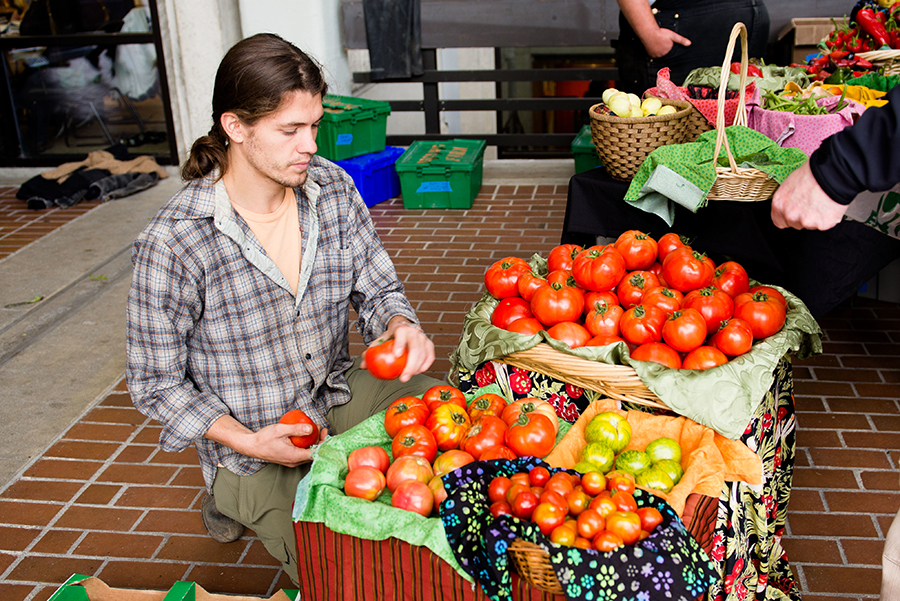About Food and Agriculture
In programs on the Food and Agriculture Path, you’ll study food and agriculture science and policy, social justice, and cultural, literary, and media perspectives. You’ll experience unique and powerful ways of learning that will help you create deep connections with your studies as you link theory with practice.
The Pacific Northwest is one of the best and most vibrant places to study food and agriculture. Pairing this with hands-on sustainable food production and community-based projects will give you a well-rounded agriculture and food studies experience and prepare you for a future in the field.
Programs on this Path cover ground in the areas of agriculture, food justice, food systems, and food studies. Whether you want to get hands-on with organic farming techniques and agriculture sciences, learn how our food systems work on a macro level, dig into the cultural importance of different cuisines, or anything else related to these topics, this Path is for you.
Prepare for Careers and Graduate Studies Beyond this Path
Career Opportunities
- Agriculture education
- Cooperative development
- Dietician
- Farming
- Food and agriculture entrepreneurship
- Food and agriculture policy
- Food justice activism in nonprofit organizations, social services, and social work
- Government agencies
- United States Department of Agriculture
- Department of Ecology
- Washington State Conservation Districts
- Landscape restoration
- Organic farming consultant
- Organic inspector and certifier
- Permaculture
Graduate School Opportunities
- Agricultural sciences, including:
- Plant, soil, and animal science
- Entomology
- Plant breeding
- Agroecology and food systems
- Agroforestry
- Business administration
- Food and agriculture policy
- Food science and nutrition
- Food studies
- Public health
- Restoration and conservation ecology
- Sociology
Community Engagement, Internships, and Volunteering
You’ll engage with food justice and policy in the classroom and beyond with community partners in the non-profit industry as well as worker-owned cooperatives and small farms. Evergreen’s Center for Community-Based Learning and Action (CCBLA) works closely with students on this Path to give you opportunities for internships, volunteering, and making connections in the field.
Learn more about Centers and Institutes
Learn more about Individual Study
The Organic Farm
Evergreen’s Organic Farm is a five-acre living laboratory that has helped launch countless student careers. The farm hosts the Practice of Organic Farming program from spring through fall each year to align with the growing season. Skills you’ll gain on the farm include:
- Organic growing methods
- Crop botany
- Planting, maintaining, and harvesting crops
- Animal husbandry (chickens and bees)
- Permaculture design process for food, water, and energy systems
- Sales, marketing, and business
- Creating value-added products
- Integrated pest management
- Teamwork, leadership, and communication skills
Learn more about the Organic Farm
Campus Gardens
Students on this Path are passionate about working in the earth. You’ll find lots of opportunities to work with fellow students, staff, and faculty while learning about the many types of gardens on campus.
- Evergreen community gardens near campus housing
- Demeter’s garden
- Ethnobotanical garden at the Indigenous arts campus
- Shellfish garden
- Medicinal herb garden
The Changemaker Lab
The Changemaker Lab is a powerful learning community based on teamwork, leadership, community empowerment, and making our world a better place. Collaborate on social entrepreneurship projects with team entrepreneurs from all over the world. Decide how you want to learn in a democratic, interdisciplinary environment.
Learn more about the Changemaker Lab in the Academic Catalog
Sustainable Agriculture Lab
The Sustainable Agriculture Lab is where you can get hands-on with food science and much more at Evergreen. Tasting and working with food is a crucial part of some programs on this Path. This food-grade space will be your laboratory to discover food on a new level.
Learn more about Labs and Studios
Study Abroad
The study abroad options on this Path are world-class learning opportunities. Travel with a tight-knit community or through an Individual Learning Contract to explore the cultures and history of people around the world.
Programs on this Path have traveled to:
- Basque Country, Spain
- China
- Costa Rica
- Nicaragua
- Peru
Explore Study Abroad
Check out related Courses and Programs in the Academic Catalog
